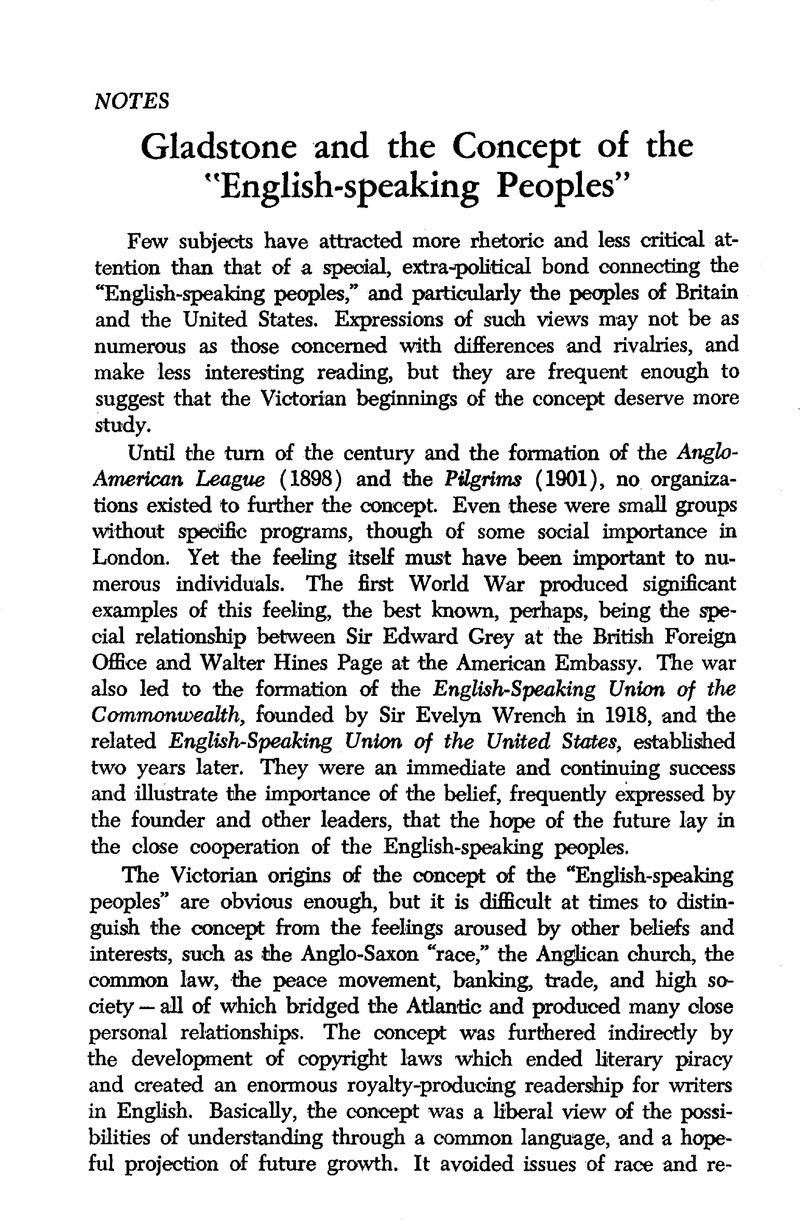Article contents
Gladstone and the Concept of the “English-speaking Peoples”
Published online by Cambridge University Press: 16 January 2014
Abstract

- Type
- Notes
- Information
- Copyright
- Copyright © North American Conference of British Studies 1972
References
1. BM, Gladstone to Hallam Tennyson, Dec. 27, 1883, Gladstone Papers, Add. Mss, 44547, f 2.
2. Zincke's predictions are in Zincke, F. B., The Plough and the Dollar (London, 1883), pp. 6–7Google Scholar.
3. George W. Smalley (1833-1916) consistently supported improved Anglo-American relations in his writings. See DNB. By coincidence both Zincke and Smalley were oarsmen in college. The former rowed for Oxford against Cambridge, the latter for Yale against Harvard.
4. BM, Smalley to Gladstone, Sept. 29, 1884. Gladstone Papers, Add. Mss, 44487, ff238-9.
5. BM, Gladstone Papers, Add. Mss, 44547, ff120-1. Gladstone's attitude toward the United States in this statement may seem very different from that expressed in his often-quoted Newcastle speech, of October 7, 1862, when he said that Jefferson Davis had created a new nation. It was in fact more a shift of policies than a change of principles. Gladstone had always regarded war and slavery as evils. In 1862 he supported European diplomatic intervention in the Civil War with the thought that it would end the bloodshed and enable the European powers to put pressure on the Confederacy to end slavery. His position was fully explained in a “Memorandum to the Cabinet on the War in America” on October 25, 1862, published in Guedalla, Philip, Gladstone and Palmerston, (London, 1928)Google Scholar. Gladstone's attitude changed with the Emancipation Proclamation, and the restoration of the Union seemed to him a vindication of popular government. This is evident from his Liverpool speech of April 6, 1886 on parliamentary reform.
Gilbert Imlay, to whom Gladstone refers in this statement, was notorious for his relationship with Mary Wollstonecraft and known for his Topographical Description of the Western Territory of North America, published in 1797.
The Latin Quotation is from Book VI of the Aeneid, in which the spirit of Anchises prophesies the extent of the Roman empire under Augustus.
6. Dilke referred to the “grandeur of our race” and to “Saxondom” in the introduction to Dilke, C. W., Greater Britain: A Record of Travel in the English-speaking Countries During 1866 and 1867 (London, 1869)Google Scholar. He concluded that: “No possible series of events can prevent the English race itself in 1970 numbering 300 millions of beings — of one national character and one tongue.” (p. 573). This prediction of numbers was fairly accurate, unlike Zincke's more exaggerated statistical projections.
7. BM, Gladstone to Smalley, Oct. 4, 1884, Gladstone Papers, Add. Mss, 44547, f 121.
8. BM, Smalley to Gladstone, Oct. 7, 1884, Gladstone Papers, Add. Mss, 44487, ff 273-4.
- 3
- Cited by




